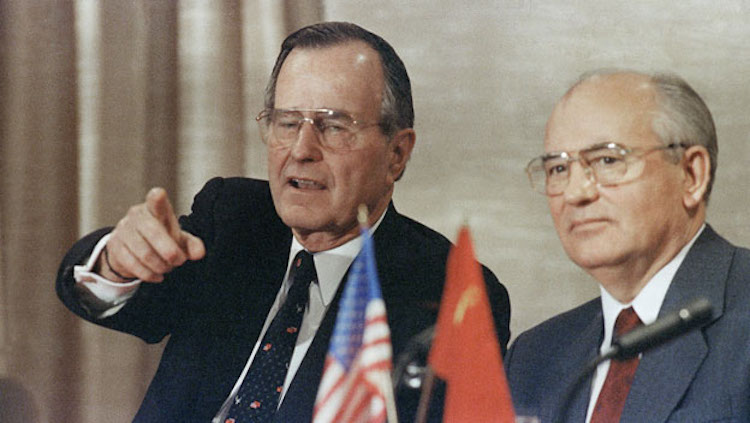By Jonathan Power
LUND, Sweden (IDN-INPS) – The great flaw in ex-president Barack Obama’s record was his policy towards Russia. Going against everything he had said and written about before he became president, one action after another antagonised the Russians.
His early proclamation that he wanted Georgia and Ukraine in NATO, his de facto coalition of convenience for a crucial couple of days with the anti-democratic, anti-Russian, neo-fascist, demonstrators in Ukraine, the further expansion of NATO, despite an earlier promise not to, made by President H.W. Bush, to the Soviet President, Mikhail Gorbachev, and his inability to cooperate with the Russians and Iranians over Syria.
No wonder the Russians are reported to be delirious that Donald Trump is now president, a man who has said nice things about Russia’s President Vladimir Putin.
If the two meet sometime soon maybe there will be an end to this unnecessary hostility. The Moscow-Washington relationship is the most important political issue in the world and this may well be the last chance to get it right.
Russia and the U.S. have never fought each other in the 200 years of their relationship. Russia aided the North during the Civil War and sent warships to prevent England and France supporting the confederacy. During the World Wars the two were close allies.
However, they came near to catastrophic war during the Cold War when Russia armed Cuba with nuclear weapons. This will never happen again. It chilled the blood down to zero on both sides.
But one can imagine limited armed clashes on the Estonian-Russian border, nuclear sabre rattling, a more intimate alliance between China and Russia, an urge to sabotage, as was done during the Cold War, any diplomacy or interventions made by the other and a continuation of both countries keeping their long-range nuclear weapons on hair-trigger alert.
Under H.W. Bush post-Cold War relations got off to a good start. Nevertheless, the U.S. treated Russia as a defeated nation that could be taken advantage of.
Unlike with Germany, Japan and Eastern Europe there was no effort to help get the Soviet Union and then Russia on to its economic feet. In September 2000, a Congressional report blamed President Bill Clinton’s Russian policy as leading to the nation’s total economic collapse in 1998.
In 2001 President George W. Bush announced that the U.S. would withdraw from the Anti-Ballistic Missile Treaty. When Georgia began its war with South Ossetia and Russia the U.S. sided with Georgia.
70% of Russians held a favourable view of the U.S. when Clinton took office in 1993 but by 2000 it had gone down to 37%. Now it is down to single digits.
Winston Churchill’s observation that “Russia is a riddle wrapped in a mystery inside an enigma” is totally wrong. Any nation on earth would have been riled if it were treated in this way – even a defeated Germany. The Russians are an intensely patriotic, cultured and religious nation. Indeed, one can say they are in aggregate, in terms of classical music, ballet, opera, literature, architecture and painting, the most cultured nation in the world.
Almost 75% of all Russians identify themselves as Orthodox Christians, pledged to uphold the same values of helping the poor and turning the other cheek as the other nations of Christendom.
They drink too much and can say stupid things and be overly hot-tempered but they are not some mysterious, oriental, predator. They are not Tatars of the steppe. When it comes to foreign policy they want first and foremost to be left alone with secure borders.
In less than two decades Russia has been reduced territorially in Europe and the Caucasus to its frontiers of 1600 and in Asia to those of the eighteenth century. Thus it is highly sensitive to perceived threats to its territorial integrity.
Gorbachev writes many thoughtful articles, which are printed in newspapers the world over. It seems that no one in the Western political elite reads them despite their wisdom and relevance. He is both a patriot and a good friend of the West.
In one he wrote “There is much talk in the United States about rethinking relations with Russia. One thing that should be definitely rethought: the habit of talking to Russia in a condescending way, without regard to its positions and interests.”
If Trump goes into this meeting with Putin thinking his bullying tactics will be as successful as it has been in his business life he will come a cropper. He needs to do most of the listening and most of the compromising.
If he plays it right he can get the Russians out of Ukraine, he can restore good economic interaction, he can get significant cuts in nuclear weapons and he can get a cooperative solution to putting Syria back on its feet and combatting ISIS (the Islamic State). But does Trump have the character to do that? [IDN-INPS – 24 January 2017]
Note: Jonathan Power syndicates his opinion articles. He forwarded this and his previous Viewpoints for publication in IDN-INPS. Copyright: Jonathan Power.
Photo: President George H. W. Bush and Soviet leader Mikhail Gorbachev declared an end to the Cold War at the Malta Summit on December 3, 1989. At a joint press conference aboard the Soviet passenger liner Maxim Gorky in Marsaxlokk Harbor, President Bush speaks about his hopes for a cooperative U.S.-Soviet relationship. Credit: history.com
IDN is flagship of the International Press Syndicate.

